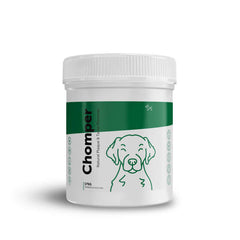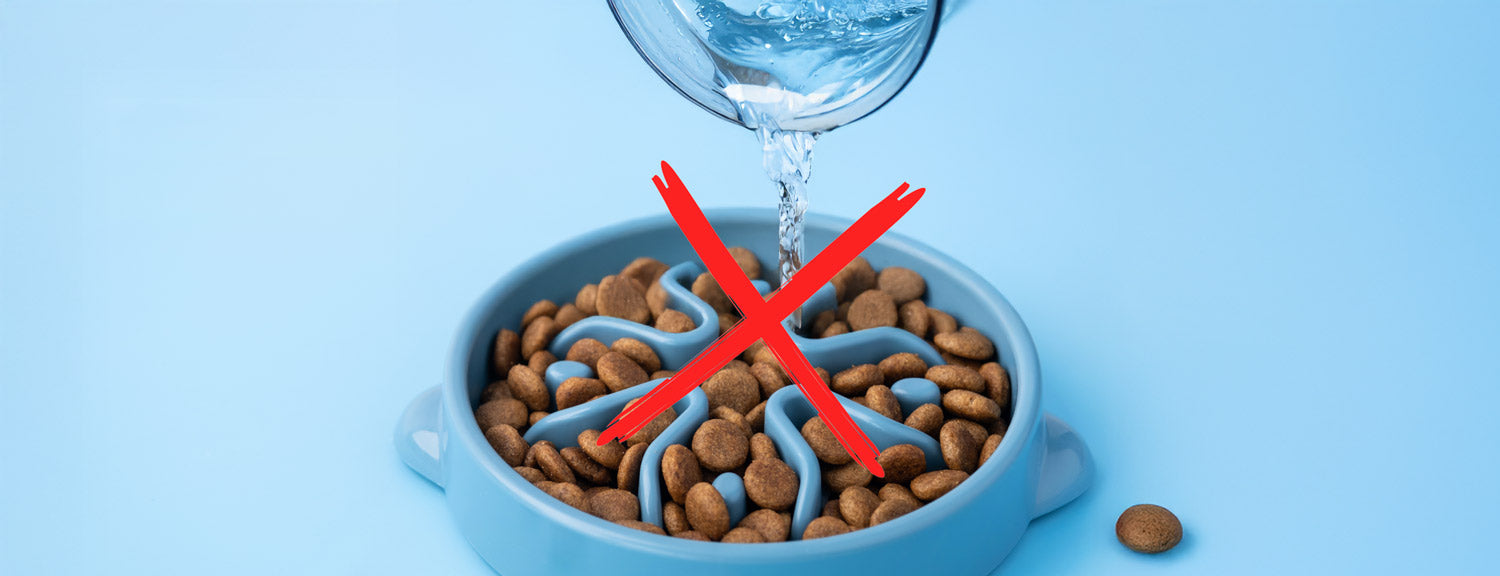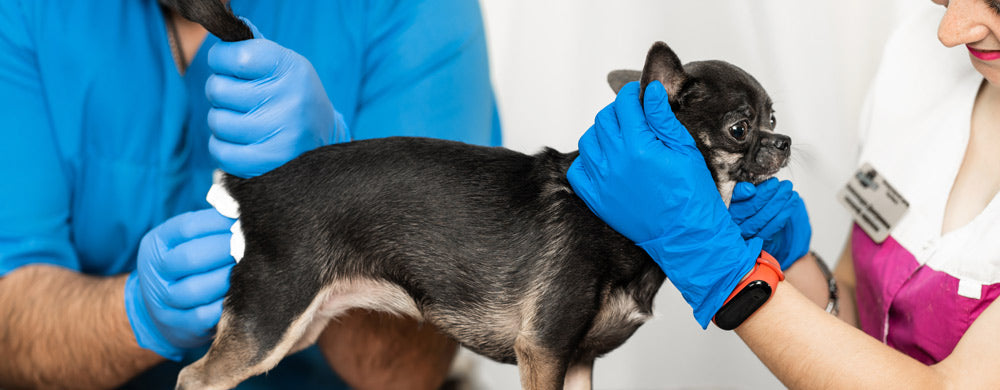Your basket is empty

Common Small Dog Health Issues You Should Know About
August 20, 2022 7 min read
Owning a small dog can undoubtedly have its advantages - they’re suited to apartment life, cost less to feed and are easily transported. And because of their size, walking a small dog is much more manageable.
However, small breeds are prone to some health issues that are much less common in big dogs. It’s important to be aware of these so you know what signs to look for and whether a small breed is the best option for you. That’s why we’ll be covering a few of the most common health issues that affect small dogs, as well as the overall pros and cons of owning a tiny companion.
***
Are Small Breeds Healthier Than Large Breeds?
While it’s true that small dogs tend to live longer than large breeds, that doesn’t necessarily mean they are healthier overall. All dogs can develop health issues, but some breeds are more prone to specific conditions. This isn’t always to do with their size - it’s simply down to poor genetics, which is often a result of overbreeding due to increasing demand.

For instance, Pugs are one of the most popular breeds in the UK, but they are also considered one of the unhealthiest. This is because they are at risk of a huge number of health problems, many of which are related to the way they have been purposely bred.
Boxers suffer from similar health concerns as Pugs (most are due to them being short-nosed dogs) despite being much bigger. Golden Retrievers, Siberian Huskies, Cocker Spaniels, and Shih Tzus are just some of the other popularly owned dog breeds that are plagued with health issues, but their differing sizes don’t make them any more or less unhealthy.
However, as mentioned earlier, research has shown that small dogs typically have longer lifespans than large dogs. That’s because big canines age quicker than small dogs, which puts strain on their physiological processes and causes them to wear out faster.
Additionally, in a study led by Cornelia Kraus, an evolutionary biologist at the University of Göttingen in Germany, it was reported that large dogs tend to die from cancer more frequently than small breeds.
Kraus believed that because big breeds grow quicker, that means they are more likely to develop abnormal cell growth found in cancer. Alternatively, large dogs may pass away from age-related health issues sooner than small dogs as they age faster.
Although little dogs can live longer than large dogs, a lot of it comes down to their breed. Interestingly, mixed breeds tend to be healthier than pedigrees as their genetics have a wider gene pool, but that doesn’t make them immune to health issues either.
***
Common Small Breed Health Problems
Below are some of the health problems that are most prevalent in small breeds.
Dental Disease

Good dental hygiene is a vital component of any dog’s care, but even more so for small breeds as they are at a higher risk of dental problems due to the anatomy of their mouths, faces, and heads.
Tartar buildup can result in bad breath and lead to pain, gum disease, broken teeth, or loss of teeth if left to progress. You should aim to brush your dog’s teeth at least two to three times a week with a dog-safe toothpaste.
Dental chews, chew toys, and natural tartar removal supplements or treats like CHOMPER and GOODIE Dental Treats are also great ways for keeping your pooch’s teeth in tip-top condition. The former contains three species of kelp and seaweed, which work together to protect and clean your dog’s pearly whites.
The latter help freshen your pet’s breath and reduce plaque build-up due to beneficial ingredients like peppermint, activated charcoal, and green tea. They’re perfect for rewarding your dog after they’ve patiently sat during routine teeth brushing!
Obesity
Although any dog can become overweight if they’re fed too much or given the wrong diet, small dogs tend to be at most risk of obesity due to their tiny stature. Little dogs don’t need as much food, so it can be easy to be a bit excessive when it comes to portion sizes and treats.
Overweight dogs are prone to many medical conditions, including diabetes, arthritis, and heart disease, so it’s important not to overfeed your pooch and ensure they get plenty of exercise.
Tracheal Collapse
Tracheal collapse is a progressive respiratory condition that happens when the cartilage rings in a dog’s trachea begin to weaken, which leads to a collapsed windpipe. Small dogs, particularly Yorkshire Terriers, Lhasa Apsos, Toy Poodles, Chihuahuas, and Shih Tzus, are more at risk of this condition as their cartilage structure is weaker.
Dogs with a collapsed windpipe will suffer from coughing fits that sound like a goose honking. Exercise, overexcitement, stress, and using a lead with a collar instead of a harness can cause tracheal collapse, but some dogs may have it from birth.
If you suspect your companion’s windpipe has collapsed, take them to see a vet straight away.
Chronic Degenerative Valve Disease
Degenerative valve disease occurs when the valves of the heart begin to wear out.
This results in the valve leaflets and strings thickening and becoming irregular, causing the backward flow of blood from the left ventricle into the top chamber of the heart.
In most cases, the mitral valve is affected, which is why it is most commonly referred to as mitral valve disease. Some dogs may not display clinical signs, but those with severe cases can exhibit symptoms like fainting, increased breathing rate, exercise intolerance, lethargy, and poor appetite.
While any dog can develop this condition, it is most common in older, small breeds, especially Cavalier King Charles Spaniels, Dachshunds, Pomeranians, Toy and Miniature poodles, Shih Tzus, and Chihuahuas.
Patellar Luxation
Patellar luxation is a displaced kneecap and is one of the most common orthopaedic conditions that affect small dogs. At first, your pooch may not exhibit any symptoms other than carrying the affected leg up for a few steps or “skipping”, shaking the leg, and then using it again.
As the condition progresses, lameness usually becomes a lot more frequent and arthritis can occur. Depending on the severity of your dog’s symptoms, treatment will differ, but surgery is usually advised.
***
What to Be Aware of Before You Own a Small Dog
Owning any dog has its ups and downs, but there are some advantages that small dogs have over large dogs. Unfortunately, the same can also be said for disadvantages.
If you’re thinking of welcoming a small breed to your home, here are a few things you need to be aware of - both the good and the bad!
1. Small Dogs Normally Live Longer
It’s not uncommon for small dogs to have longer lifespans than big dogs as they age slower. The average life expectancy for a small breed is between 10 to 15 years, but some breeds can live even longer.
Large dogs, on the other hand, have an average lifespan of between 8 to 12 years.

2. Small Dogs Are Easier to Transport
Due to their tiny stature, small dogs are easier to transport than large breeds, whether you’re travelling by car, train, or plane. Some airlines allow small dogs in the cabin, whereas large dogs will need to travel in the cargo hold.
3. Small Dogs Don’t Need As Much Space
Large dogs take up a lot of room, so they aren't exactly suited to apartments and small homes. Small dogs are a great option if you’re short on space, especially as they normally have lower exercise needs.
4. Small Dogs Cost Less to Keep
Owning a dog can be a big financial commitment - food, equipment, flea/worm treatments, vet bills, etc, can really add up. However, small dogs are a little cheaper to keep than large dogs as they don’t need as much food. Veterinary care also tends to be less costly for little dogs.
Spaying/neutering and other surgeries, for instance, are normally more expensive for large canines as most veterinarians calculate their pricing by the size of the dog.
5. Small Dogs Can Be Noisy
Many small breeds are notorious loud barkers, including Yorkshire Terriers, Chihuahuas, Pomeranians, and Malteses. They have a bad reputation for being incessantly yappy, which can be a nuisance if you have small children, neighbours, or simply want to live in peace and quiet.
6. Small Dogs Are Fragile
Due to their little size, small dogs are extremely delicate, so you need to be careful around them, both inside and outside the home. For example, you could unintentionally hurt a small dog if you handle them too roughly or accidentally tread on their paw.
Alternatively, a large dog could easily injure a small breed if they get into a fight, especially as little dogs tend to act a lot bolder and fiercer than they really are.
7. Small Dog Syndrome
As charming as little dogs are, their small size also means they get away with a lot more. Compared to large breeds, small breeds often get a free pass for undesirable behaviours like excessive barking, growling at other dogs, begging for food, jumping on furniture, etc, simply because many owners find it “cute” or think it isn’t a big deal. It’s important to set clear boundaries for dogs, no matter how big or small they are.
***
Final Thoughts
To sum up, small dogs can be a great choice over large breeds if you don’t have a lot of room in your home or want to save a bit of money on food. There are also some drawbacks to owning a tiny dog - they can be noisy barkers, disobedient if not properly trained, and prone to specific medical conditions that largely only affect smaller breeds.
However, as long as you’re aware of these risks and take the right preventative measures, there’s no reason why a small breed can’t be the perfect companion for you or your family.
Also in Pet Advice

Should You Add Water to Your Dog’s Kibble? Here’s What the Science Says
August 14, 2025 7 min read
Should you add water to your dog’s kibble? Discover the science-backed pros, cons, and better alternatives like bone broth and fresh food to improve hydration, digestion, and overall canine health...

DIY Frozen Dog Treats Your Pup Will Love
June 27, 2025 4 min read
Summer heat can be dangerous for dogs, making hydration more important than ever. Learn how to spot signs of dehydration, boost your pup’s water intake, and create fun, frozen recipes to keep them happy and healthy all season long.

Why Is My Dog Scooting? Common Causes and How Diet Can Help
May 09, 2025 4 min read
If your dog is scooting or smells fishy, it could be due to blocked or irritated anal glands. Learn what causes blocked anal glands, which dogs are most at risk, and how simple dietary changes—like adding fibre and anti-inflammatory nutrients—can help prevent recurring problems.
